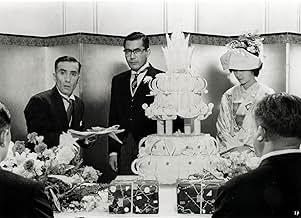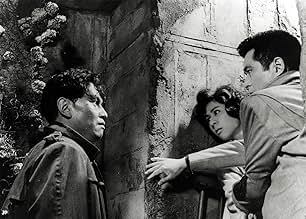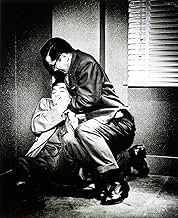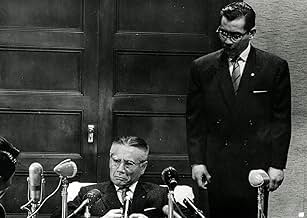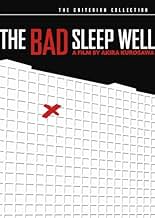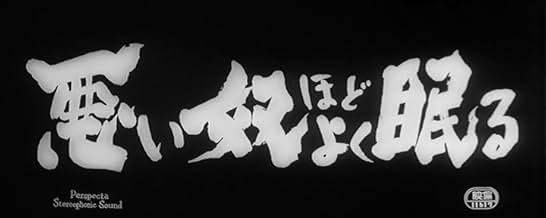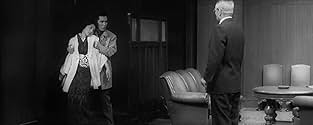IMDb RATING
8.0/10
15K
YOUR RATING
A vengeful young man marries the daughter of a corrupt industrialist in order to seek justice for his father's suicide.A vengeful young man marries the daughter of a corrupt industrialist in order to seek justice for his father's suicide.A vengeful young man marries the daughter of a corrupt industrialist in order to seek justice for his father's suicide.
- Awards
- 3 wins & 1 nomination total
Featured reviews
Arguably the darkest, bleakest & most cynical of all Akira Kurosawa films, The Bad Sleep Well is an impressive amalgamation of assured direction, excellent writing & solid performances that not only works as an effective & engaging revenge drama but also serves as a sharp critique of corporate corruption.
The story begins with a masterly curated wedding sequence that aptly introduces all the relevant characters, and paves its foundation by letting the news reporters provide background details about each through their gossips. The revenge plan is already in motion when the film starts, and that scene does well to bring us up to date.
The set pieces are refined, detailed & beautifully lit while the fluid camerawork & crisp greyscale photography provide the imagery its rich intensity & timeless flair. Editing is carried out well for the most part but pacing does slip a little before the third act. All the actors play their roles responsibly, plus it's got Takashi Shimura in a rare villainous role.
Overall, The Bad Sleep Well finds Akira Kurosawa in complete control of his craft, and is yet another quality addition to the legendary auteur's oeuvre. Maintaining its firm grip on audience, the film is tense, captivating & thrilling for the majority of its 151 mins runtime before culminating with an ending that hits close to real-life. In short, an underrated & underseen gem.
The story begins with a masterly curated wedding sequence that aptly introduces all the relevant characters, and paves its foundation by letting the news reporters provide background details about each through their gossips. The revenge plan is already in motion when the film starts, and that scene does well to bring us up to date.
The set pieces are refined, detailed & beautifully lit while the fluid camerawork & crisp greyscale photography provide the imagery its rich intensity & timeless flair. Editing is carried out well for the most part but pacing does slip a little before the third act. All the actors play their roles responsibly, plus it's got Takashi Shimura in a rare villainous role.
Overall, The Bad Sleep Well finds Akira Kurosawa in complete control of his craft, and is yet another quality addition to the legendary auteur's oeuvre. Maintaining its firm grip on audience, the film is tense, captivating & thrilling for the majority of its 151 mins runtime before culminating with an ending that hits close to real-life. In short, an underrated & underseen gem.
For his first film made by his own independent production company, Kurosawa decided to take advantage of his new creative freedom to make his most politically daring picture to date. He takes on the corruption rife in corporate Japan in a film noir of almost epic proportions.
This was Kurosawa's most stylised film so far. He takes a nasty, tragic film noir plot-line (and yes, there are elements of Hamlet, but not enough to call it an adaptation) but plays it at some times as if it was a farcical comedy, and at others like it was a horror. The villainous characters appear slightly ridiculous and even cartoonish. Only the most senior amongst them, Iwabuchi, is allowed to keep his dignity. While the others are just puffed-up minions, easily toppled, Iwabuchi seems truly immovable.
The establishing scenes are the film's strongest. It opens, like The Godfather, with a lengthy wedding scene which serves to introduce all the principle characters and set the tone. Everything about the way this scene is put together tells us this is not the happy occasion it should be the hall where the ceremony takes place echoes off-puttingly, a company official about to make a speech cringes as champagne corks go off behind him like gun shots. Add to this an interruption from the police, a gang of journalists and photographers waiting in the wings, and a best man's speech that turns from jokes to threats, and you can practically taste the corruption and decadence that is the focus for this story.
The wedding scene is followed by a montage of newspaper headlines and newsreel footage, reminiscent of similar devices used by Frank Capra and Raoul Walsh. Kurosawa brilliantly choreographs this sequence to music, a rather eerie little dirge more typical of a Japanese period piece than a modern thriller. It's the only example of this kind of montage I know of in Kurosawa's work (it was rare for him to expand the narrative to the bigger picture), but it's a highly effective one-off.
The central plot, of Nishi (Toshiro Mifune) orchestrating spectacular revenge against the men who killed his father, is full of amazing set-pieces. There are echoes of Hitchcock in the way Kurosawa shoves significant objects right up to the camera. The use of music is dazzling, combining upbeat music with unnerving moments to give a great sense of irony. Nishi is the last person the villains suspect, and he often appears innocently in the background with little more significance than an extra, although of course the audience knows better. It's a nice touch that Kurosawa has the character wear glasses, making Mifune almost unrecognisable to us as well.
Sadly, the film's pace slows down after the first hour, and rarely gets back to the same dizzying heights for the rest of its 145 minutes. The lengthy runtime does however allow Kurosawa to add a depth that is absent from your average 100-minute Hollywood Film Noir. Kurosawa could be bleak, but he never forgot the humanity in his films, and this is really the focus in the second half of the film. He takes time to put the spotlight on the innocent victims of revenge (Nishi's wife, Wada's family), and even show the arch-villain in moments of warmth and tenderness with his family. And this is perhaps where the story's biggest similarity with Hamlet is Nishi's revenge falls apart because he is unable to be totally ruthless and unfeeling.
As for the acting, Masayuki Mori is particularly good as Iwabuchi. Just look at his reaction when the second wedding cake pulls up behind him remaining calm, but clearly suppressing concern and annoyance. Kamatari Fujiwara and Akira Nishimura give great over the top performances as Wada and Shirai respectively. Unfortunately this is not one of Toshiro Mifune's great performances. Mifune had an incredible range, but somehow he doesn't quite work as Nishi. In particular, for me he doesn't quite get the emoting right when he begins to realise his feelings for his wife.
Kurosawa always liked to be making some kind of point with all his films, something which sometimes got in the way of decent storytelling. The Bad Sleep Well is a political soapbox picture if ever there was one, but luckily in this case that doesn't water it down quality-wise. True, it is perhaps a little too long, and there are a few dull stretches, but Kurosawa's direction was still at its peak and this stands as one of his best contemporary-set pictures.
This was Kurosawa's most stylised film so far. He takes a nasty, tragic film noir plot-line (and yes, there are elements of Hamlet, but not enough to call it an adaptation) but plays it at some times as if it was a farcical comedy, and at others like it was a horror. The villainous characters appear slightly ridiculous and even cartoonish. Only the most senior amongst them, Iwabuchi, is allowed to keep his dignity. While the others are just puffed-up minions, easily toppled, Iwabuchi seems truly immovable.
The establishing scenes are the film's strongest. It opens, like The Godfather, with a lengthy wedding scene which serves to introduce all the principle characters and set the tone. Everything about the way this scene is put together tells us this is not the happy occasion it should be the hall where the ceremony takes place echoes off-puttingly, a company official about to make a speech cringes as champagne corks go off behind him like gun shots. Add to this an interruption from the police, a gang of journalists and photographers waiting in the wings, and a best man's speech that turns from jokes to threats, and you can practically taste the corruption and decadence that is the focus for this story.
The wedding scene is followed by a montage of newspaper headlines and newsreel footage, reminiscent of similar devices used by Frank Capra and Raoul Walsh. Kurosawa brilliantly choreographs this sequence to music, a rather eerie little dirge more typical of a Japanese period piece than a modern thriller. It's the only example of this kind of montage I know of in Kurosawa's work (it was rare for him to expand the narrative to the bigger picture), but it's a highly effective one-off.
The central plot, of Nishi (Toshiro Mifune) orchestrating spectacular revenge against the men who killed his father, is full of amazing set-pieces. There are echoes of Hitchcock in the way Kurosawa shoves significant objects right up to the camera. The use of music is dazzling, combining upbeat music with unnerving moments to give a great sense of irony. Nishi is the last person the villains suspect, and he often appears innocently in the background with little more significance than an extra, although of course the audience knows better. It's a nice touch that Kurosawa has the character wear glasses, making Mifune almost unrecognisable to us as well.
Sadly, the film's pace slows down after the first hour, and rarely gets back to the same dizzying heights for the rest of its 145 minutes. The lengthy runtime does however allow Kurosawa to add a depth that is absent from your average 100-minute Hollywood Film Noir. Kurosawa could be bleak, but he never forgot the humanity in his films, and this is really the focus in the second half of the film. He takes time to put the spotlight on the innocent victims of revenge (Nishi's wife, Wada's family), and even show the arch-villain in moments of warmth and tenderness with his family. And this is perhaps where the story's biggest similarity with Hamlet is Nishi's revenge falls apart because he is unable to be totally ruthless and unfeeling.
As for the acting, Masayuki Mori is particularly good as Iwabuchi. Just look at his reaction when the second wedding cake pulls up behind him remaining calm, but clearly suppressing concern and annoyance. Kamatari Fujiwara and Akira Nishimura give great over the top performances as Wada and Shirai respectively. Unfortunately this is not one of Toshiro Mifune's great performances. Mifune had an incredible range, but somehow he doesn't quite work as Nishi. In particular, for me he doesn't quite get the emoting right when he begins to realise his feelings for his wife.
Kurosawa always liked to be making some kind of point with all his films, something which sometimes got in the way of decent storytelling. The Bad Sleep Well is a political soapbox picture if ever there was one, but luckily in this case that doesn't water it down quality-wise. True, it is perhaps a little too long, and there are a few dull stretches, but Kurosawa's direction was still at its peak and this stands as one of his best contemporary-set pictures.
10maurazos
I am watching Kurosawa's full collection and the more I watch, the more I love the art of "The Emperor". And unlike many Kurosawa's fans, my preferred films are those that talk about the time Kurosawa lived, not about the samurai ages. Again, Kurosawa uses the literature classics (for this film, Shakespeare's "Hamlet") as a source for his stories, proving that the subjects they talked about are still modern. Anyway, the genius of Kurosawa is quite big to make their film be not just a cinema remake of those texts, but an original, exciting plot. And again, Kurosawa gives us a film with a clear and worrying social message, a denounce to a serious problem (company and state corruption that even today still darkens the image of a "100% legal" Japan). A film to enjoy and film to learn about Japanese society and life in a general way.
I just watched "The Bad Sleep Well," and finished reading the other viewers comments. So I will comment on both. "Seven Samurai" is perhaps my favorite film of all time, and I really like Kurasawa's work. Other than the brief plot summary, I didn't really know what to expect from "The Bad Sleep Well." The beginning can be somewhat confusing, as the reporters throw out lots of Japanese names and the viewer must struggle to understand what's going on and who is who. But as the film progressed, I found myself drawn in and completely absorbed by it. Don't worry if you don't get it at first, all will become clear. I found this to be an excellent film, and I would recommend it to any Kurasawa film. Sure, it's not action-packed like his samurai films. And yes, it is somewhat slow in pace. But I must say that I didn't really mind that. I found it quite engrossing. There are enough plot twists and turns to keep the viewer interested. I din't think that Toshiro Mifune did a bad job either, as some other viewers thought. He's not wild and crazy like in "Seven Samurai" or "Rashomon" but I didn't think he was badly cast. Sadly, I am not intimately familiar with "Hamlet," so I can't comment too much on the similarities. It seems to be the general opinion that this "The Bad Sleep Well" is loosely based on Hamlet, but I also agree that this won't detract from your enjoyment of the film in any way, and that knowing "Hamlet" doesn't mean that you will know what happens in this film. I agree with those who say that this is another underrated Kurarsawa masterpiece, and well worth seeing. Give it a chance!
The Bad Sleep Well is a great film, with excellent acting from all the actors, especially my favorite Japanese actor, Takashi Shimura as Moriyama. Kurosawa shows in this film that no one can or will ever top his skill at doing tableau shots. The wedding scene in the beginning of the film, where the reporters are standing just outside the doors of the reception hall, commenting on the goings on within, is fantastic. The ending seems very abrupt, almost as if they ran out of time while making the film, keeping this one out of the same league as other Kurosawa classics (7 Samurai, Stray Dog, Yojinbo).
Did you know
- TriviaThe ideas for the film came from Akira Kurosawa's nephew, Mike Y. Inoue, who wanted to be a scriptwriter and was giving his scripts to his uncle. Kurosawa liked it and made suggestions, to which Inoue spent six months rewriting the script under the title "Bad Men's Prosperity." Kurosawa, along with several others, reworked it even more into the final version, though Inoue did not receive screen credit.
- GoofsWhen Nishi is trying to push Shirai out of the window, the brick wall outside of the window moves around - a lot.
- Quotes
Koichi Nishi: It's not easy hating evil. You have to stoke your own fury until you become evil yourself.
- Alternate versionsOriginally released at 151 in Japan; USA version removes 16 minutes of footage.
- SoundtracksBridal Chorus
(uncredited)
from "Lohengrin"
Music by Richard Wagner
Played at the end of the wedding ceremony
- How long is The Bad Sleep Well?Powered by Alexa
Details
- Release date
- Country of origin
- Language
- Also known as
- Les salauds se portent bien
- Filming locations
- Aso Kuju National Park, Kyushu, Japan(volcanic area)
- Production companies
- See more company credits at IMDbPro
Box office
- Budget
- ¥82,540,000 (estimated)
- Gross US & Canada
- $46,808
- Opening weekend US & Canada
- $15,942
- Jul 28, 2002
- Gross worldwide
- $47,023
- Runtime2 hours 31 minutes
- Color
- Aspect ratio
- 2.35 : 1
Contribute to this page
Suggest an edit or add missing content

Top Gap
By what name was Les salauds dorment en paix (1960) officially released in India in English?
Answer

